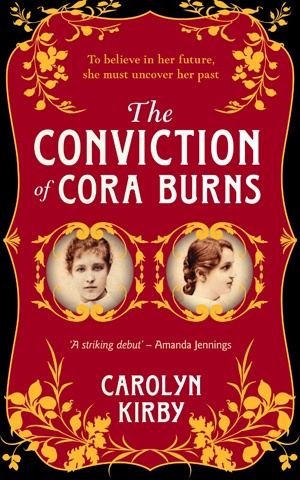
Written by Carolyn Kirby — Way back in the annals of literature, through Mary Shelley’s Frankenstein to the present day, writers have loved to take the trope of nurture versus nature and run with it. Here’s a recent addition to that ever-growing list and it’s a debut historical crime novel that’s certainly worth your attention.
The Conviction of Cora Burns is set in Birmingham in 1885, and the Cora of the title is a young woman who has never had much luck in life. She was born in prison and then brought up in the workhouse, never knowing her mother or her father. Then it was back to jail again, although it is a while before we learn the full details of her crime.
We first meet her as she is about to enter the outside world for the first time. For some it would be a scary place, but to Cora it’s a challenge to be beaten – sometimes literally. For this is no shrinking violet, Cora has dark and violent depths and she’s the first example of the nurture/nature thread that runs through this book.
She might be free, but freedom is just a word to someone who has no money, friends or family. So Cora reluctantly takes up a job as a servant in the home of scientist Thomas Jerwood, and there she befriends a young girl called Violet. It becomes clear that Jerwood is using Violet for some kind of living experiment and soon Cora is pulled into the scheme too. At first, things seem fairly innocuous, but Cora discovers a disturbing twist to her master’s studies and things step up a notch or two.
The main narrative jumps between timelines revealing, little by little, the truth of Cora’s past. These chapters are interspersed with articles written by Thomas Jerwood and by a doctor from the local asylum. Some of these chapters are a little long and overburdened with detail, so much so that you may be tempted to skim a bit – but do this at your peril, because their pages contain important pieces of this complicated jigsaw.
There’s more than a touch of the gothic about The Conviction of Cora Burns, with a shady scientist, darkly dangerous mansion house and even a mad wife thrown into the mix. Thankfully it all gels together beautifully and you’ll soon get completely lost in another era.
This is a beautifully conceived tale, with spot-on settings and finely drawn characters. A huge amount of research has obviously gone into this book – it is packed with authentic detail and immerses the reader in Victorian life and times. At one point Cora meets a photographer, and I particularly enjoyed the chapters which feature this, then fledgling, art form and would have welcomed more of them.
At the heart of everything is Cora herself. She is a complex character, unpredictable and deep as well as deeply flawed. She should be unlovable but I still found myself warming to her. However, this is a woman with a dark past, and something she did back then haunts her still. But how much of it is real and how much is just a figment of her imagination? It is to author Carolyn Kirby’s credit that she keeps us on tenterhooks for so long and as a debut author she is to be congratulated on creating such a luscious slice of Victoriana – it’s no wonder that Cora Burns is being nominated for awards.
Fans of historical crime are going to love this book, with its period detail and compelling cast, but it should also appeal to those who just enjoy a cracking good read. Grab yourself a copy and get pleasurably lost in the atmosphere and intrigue contained within its covers. Let’s hope it isn’t too long before we have another book from this exciting new talent!
If you like this, you might also like The Murder of Harriet Monckton by Elizabeth Haynes. Looking for more inspiration? Read Barry Forshaw’s guide to the best of historical crime .
No Exit Press
Print/Kindle/iBook
£3.27
CFL Rating: 4 Stars










